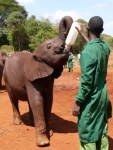What’s most striking is the soil. It’s hard not to imagine this place a continent of bloodshed when the Earth itself seems a vast ocean of blood. But that red, the way it grabs and takes hold of your gaze making it something more than dirt below your feet. That red finds its way onto your clothes, below your fingernails, and coloring your skin, that red that whispers up in small gusts, whirling lyrically in circles, that red tells us: Africa truly is a land unto its own.
But today I can only see that land form inside a walled garden. My layover in Nairobi puts me at the Intercontinental Hotel, which is easily the most high-end hotel I’ve ever stayed at. While it may be lacking in a few modern features, it is the way it allows its guests to completely exist in a different world that that land outside its security checkpoint. One Dutchman, who I briefly spoke with over breakfast, told me while picking at his $30 English Breakfast: “I love this continent and I’ll never leave, but I’ll be damned if I set a foot out on the street.” Through the glass behind him I could see another man taking a morning swim in the pool while African porters began to set out the lounge chairs under the palm trees. Behind those trees: only high walls to keep Africa out.
A quote from V.S. Naipaul has stuck with me since finishing “A Bend in the River”:
“In the beginning, before the arrival of the white men, I had considered myself neutral. I had wanted neither side to win, neither the army nor the rebels. As it turned out, both sides lost.”
It doesn’t really matter when this was in history, I’ve been here for a single day and I can see the fingerprints of the white men and of colonialism. Before today I understood that colonialism was a terrible failure and a blight on humanity, now I KNOW that.
In any case, when you’re stuck in the Walled Garden, as all you Apple fanatics know, you might as well enjoy the hell out of it. A young British couple and I shared a taxi out to the elephant orphanage and saw the baby elephants being fed and ‘bathed’ in mud and sand. It was a fantastic experience and the donations raised from the daily feeding shows allow them to save the lives of many elephants each year. They are so dedicated to the orphans that each handler spends every minute of the day with the elephant, even sleeping in the same stable room.
I wandered around the city center, shared a delightful cup of coffee with a Zimbabwean refugee who dreamed of going to a veterinarian school in America, and gained a few blisters from my new sandals. It’s a decent start to the next four months in Africa, four months of that red sand.







